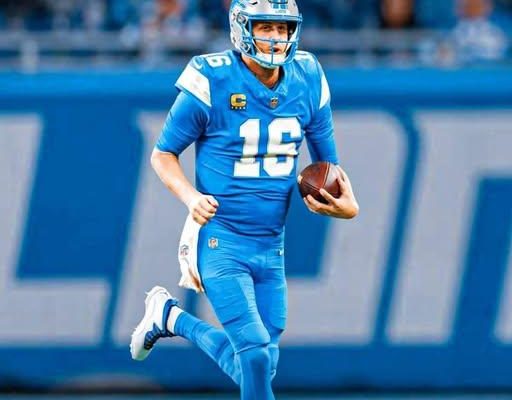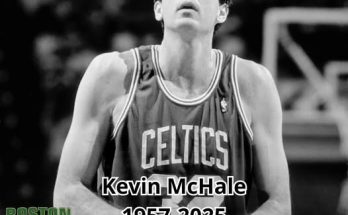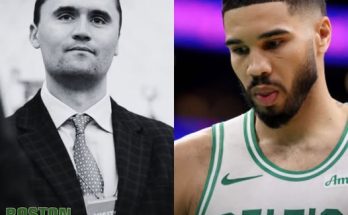The Los Angeles Rams sent Jared Goff to Detroit to disappear. Instead, he rose.
When the Rams pulled the trigger on the blockbuster trade that sent quarterback Jared Goff to the Detroit Lions in exchange for Matthew Stafford, the message from Los Angeles was unmistakable. They were finished with Goff. Despite leading the team to a Super Bowl appearance in just his third season and earning two Pro Bowl nods, Goff had worn out his welcome in Sean McVay’s offense. His inconsistencies, hesitancy under pressure, and lack of downfield aggression had grown frustrating to a team chasing a title. The Rams felt they could no longer win with him. So, they packaged him with multiple first-round picks—essentially sweetening the deal just to offload him. The consensus around the league at the time was that Goff was being dumped on a rebuilding team where he could fade away quietly, a forgotten former No. 1 pick who would eventually be replaced by a younger, more dynamic option. But Goff had other plans.
There was a quiet determination in Jared Goff that few could see beneath the smirks and California cool demeanor. Upon arriving in Detroit, he inherited a team that had just gone 5–11, had a new coaching staff with zero expectations, and was widely considered one of the league’s least talented rosters. Dan Campbell was a first-time head coach known more for his fiery speeches than tactical acumen. Offensive coordinator Anthony Lynn, and later Ben Johnson, had their own battles to fight. No one gave Goff a shot to make Detroit competitive. He was viewed as a placeholder at best, a liability at worst. Yet Goff chose not to see it that way. Instead, he embraced the Lions as a fresh start—a place where he could rebuild himself and his reputation without the noise and pressure of Los Angeles. Detroit wasn’t just a pit stop for him; it became his battleground.
In his first season with the Lions, the team finished 3–13–1. The win-loss record was brutal, but if one watched closely, they could see the early foundation of something stronger forming. Goff played without a proven receiving corps, battled injuries across the offensive line, and still managed to remain composed. His final numbers weren’t extraordinary, but his effort and resilience were noted. More importantly, the people around him in Detroit began to believe. Goff was showing leadership, humility, and toughness. He took hits, stayed in the pocket, and never publicly complained about the roster or coaching changes. He just kept working.
By his second season, the Lions started turning heads. With Ben Johnson installed as the offensive coordinator and a new batch of offensive weapons including Amon-Ra St. Brown, Jamaal Williams, and a reshuffled line featuring Penei Sewell and Frank Ragnow, the Lions began to find rhythm. Goff began to look like the quarterback many had forgotten he could be. His accuracy returned. His poise improved. Most notably, his decision-making evolved. He wasn’t just a system quarterback anymore; he was diagnosing defenses, leading drives, and making plays off-script. The Lions finished 9–8 that season, and while they missed the playoffs by a narrow margin, it was clear that something special was building. Goff led the league in several key metrics down the stretch and, importantly, led the Lions to a thrilling win over the Packers at Lambeau Field in Week 18, eliminating Green Bay from the playoffs and giving Detroit a statement victory.
That game felt like a turning point. Not just for the team, but for Goff personally. It was the moment when the NFL—and the Rams—had to take a second look. This wasn’t the quarterback they sent packing anymore. This was a player reborn, one who had taken the rejection and turned it into resolve. Goff wasn’t just surviving in Detroit. He was thriving.
The 2023 season cemented that narrative. Detroit entered the year with playoff expectations for the first time in decades. Goff embraced the spotlight, throwing for over 4,500 yards, finishing among the top five quarterbacks in passer rating, and leading Detroit to a 12–5 record and an NFC North title. Under his leadership, the Lions secured their first playoff win since 1991, a staggering drought broken in poetic fashion by the quarterback deemed not good enough for Hollywood. Goff was no longer a reclamation project. He was a franchise quarterback again, and this time, it was on his terms.
What made Goff’s resurgence even more impressive was the manner in which it unfolded. He didn’t reinvent his game with flashy improvisation or a cannon arm suddenly developed overnight. Instead, he doubled down on what he did best—timing, rhythm, accuracy, leadership. He matured. He trusted his offensive line and receivers. He worked tirelessly with Ben Johnson to design an offense that catered to his strengths—play action, pocket precision, smart progressions. Their chemistry as play-caller and quarterback became one of the most underrated stories in the league.
Off the field, Goff embraced Detroit in a way few anticipated. He immersed himself in the community, bought into the blue-collar ethos of the city, and became a vocal advocate for the team’s upward trajectory. There was no ego, no bitterness about how things ended in L.A. When asked about the trade, Goff never took shots. Instead, he focused on what he could control and let his performance do the talking. The contrast between Goff and the quarterback the Rams chose over him, Matthew Stafford, added another layer of intrigue. While Stafford delivered a Super Bowl title to Los Angeles in his first season, injuries and inconsistency plagued him afterward. Meanwhile, Goff was getting stronger, year by year. The arc of their careers seemed to bend in opposite directions post-trade.
Goff’s journey has become symbolic of something deeper in the NFL. In a league that often discards players quickly, branding them as busts or backups with little patience for growth, Goff has reminded everyone that development isn’t always linear. Sometimes a player needs time, new scenery, a different voice in their ear. Sometimes adversity is the very thing that unlocks greatness. For Jared Goff, being exiled to Detroit was supposed to be the end. It turned out to be the beginning.
As he enters another season at the helm of a Lions team with Super Bowl aspirations, Goff’s place in the NFL hierarchy has changed. He’s no longer a castoff or a curiosity. He’s a leader, a survivor, and perhaps the most powerful reminder that resilience still matters in pro football. The story of Jared Goff and the Detroit Lions isn’t just one of redemption. It’s one of rebirth.
Detroit didn’t just give Goff a new team. It gave him his identity back. And now, as the Rams watch from afar, it’s impossible not to wonder what might have been had they chosen patience over panic. But for Goff, there’s no looking back. There’s only forward. The league tried to forget him. He made them remember.



